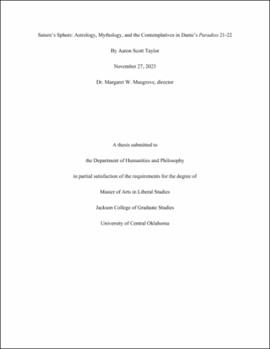| dc.contributor.advisor | Musgrove, Margaret Worsham, 1962- | |
| dc.contributor.author | Taylor, Aaron Scott | |
| dc.date.accessioned | 2024-02-29T21:53:39Z | |
| dc.date.available | 2024-02-29T21:53:39Z | |
| dc.date.issued | 2023 | |
| dc.identifier.other | (AlmaMMSId)9983007905502196 | |
| dc.identifier.uri | https://hdl.handle.net/11244/340199 | |
| dc.description.abstract | In the arrangement of souls in Dante's Paradiso, the poet places the most blessed category of souls, the contemplatives, in the sphere of Saturn, a planet generally considered to be "The Greater Infortune" in medieval astrology (Paradiso 21-22). This thesis asks and answers the question why this should be so. Scholarly literature on Dante has rarely dealt with this question in depth. Commentators since the fourteenth century have typically offered a brief explanation, and one often finds these explanations more or less expanded upon in the tradition of Lecturae Dantis. But to my knowledge, the only prolonged consideration of the nature of Saturn in Paradiso is the relevant chapter of Richard Kay's Dante's Christian Astrology, which tends to focus more on details than on the larger question. My thesis is that when fully examined the medieval associations of Saturn actually constitute an atmosphere peculiarly appropriate to contemplative hermits, and an understanding of this "Saturnine atmosphere" will enable us to read rightly both the two speaking figures of the cantos, Peter Damian and Benedict of Nursia, as well as the two lesser figures who are named as present but remain silent, Macarius and Romuald. In order to develop this thesis, I consider Dante's sources, both confirmed and surmised, in order to develop a portrait of Saturn as he was understood by the fourteenth century, employing contemporary definitions and etymologies of the appropriate terms. I look at Paradiso's intertextual relations with those authors, ancient, late antique, and medieval, in connection with the Saturnine associations they furnish. I use those results to demonstrate the nature of the Saturnine atmosphere developed in Paradiso 21-22, comparing the images and qualities of Saturn with the characterizations and images of Saturn's sphere in the Commedia. Then I consider the lives, writings, and depictions in the appropriate cantos of the four contemplatives that Dante identifies, demonstrating how they relate to the Saturnine atmosphere and associations and why the poet might have chosen each of them for inclusion in Saturn's sphere. Special attention is given to the identity of Macarius, as there are at least three possibilities and Dante does not specify in any way which one he is thinking of. I find that the medieval understanding of Saturn is truly integral to the atmosphere and events of Par. 21-22, and that there are many examples of this in the lives, writings, and role in the Commedia of the four souls in question. These findings significantly deepen our understanding of these cantos and their connection with the architectonics of Paradiso. Future research might focus in more depth on one of the four contemplatives, particularly the much neglected Macarius, consider to a greater degree the role of Saturnine allusions and imagery in other parts of the Commedia and perhaps even in Dante's lyrics, and treat more profound themes connected with Saturn and Paradiso in light of critical theory, such as the work of Walter Benjamin and Mikhail Bakhtin. | en_US |
| dc.rights | All rights reserved by the author, who has granted UCO Chambers Library the non-exclusive right to share this material in its online repositories. Contact UCO Chambers Library's Digital Initiatives Working Group at diwg@uco.edu for the permission policy on the use, reproduction or distribution of this material. | |
| dc.subject.lcsh | Dante Alighieri, 1265-1321--Paradiso--Criticism and interpretation | |
| dc.subject.lcsh | Saturn (Roman deity) | |
| dc.subject.lcsh | Cronus (Greek deity) | |
| dc.subject.lcsh | Astronomy, Medieval, in literature | |
| dc.subject.lcsh | Cosmology, Medieval, in literature | |
| dc.subject.lcsh | Contemplative orders--In literature | |
| dc.subject.lcsh | Hermits in literature | |
| dc.subject.lcsh | Heaven in literature | |
| dc.subject.lcsh | Planets in literature | |
| dc.subject.lcsh | Astrology in literature | |
| dc.subject.lcsh | Mythology in literature | |
| dc.subject.lcsh | Theology in literature | |
| dc.subject.lcsh | Christian poetry--History and criticism | |
| dc.subject.lcsh | Saturn (Planet)--In literature | |
| dc.title | Saturn's sphere : astrology, mythology, and the contemplatives in Dante's Paradiso 21-22 | en_US |
| dc.type | Academic theses | |
| dc.contributor.committeeMember | Weber, Reid | |
| dc.contributor.committeeMember | Holt, Annie | |
| dc.thesis.degree | M.A., Liberal Studies | |
| dc.subject.keywords | Divine Comedy | |
| dc.subject.keywords | Golden Age | |
| dc.subject.keywords | Hermits | |
| dc.subject.keywords | Monasticism | |
| dc.subject.keywords | Saturn | |
| dc.subject.keywords | Medieval literature | |
| dc.subject.keywords | Religious history | |
| dc.subject.keywords | Classical studies | |
| dc.identifier.oclc | (OCoLC)1424623643 | |
| thesis.degree.grantor | Jackson College of Graduate Studies | |
